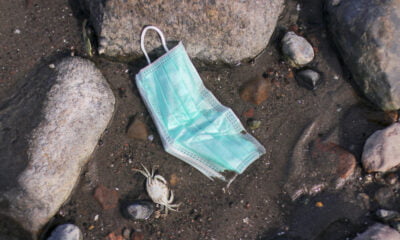

Environment
Eco-Friendly Travel Tips: How To Reduce Waste While Traveling
Whether you’re headed to the winding mountains of the Himalayas or the hustling bustling city of Mumbai, it’s your responsibility to preserve the nature of your destination. Eco-sustainability plays a pivotal role in reducing waste and preserving endangered wildlife and valuable ecosystems. Small changes in your lifestyle, such as packing light and choosing economy class over business, can make a huge difference in the greater context of environmental preservation.
Here are some eco-friendly travel tips to help you significantly reduce your waste during your travels.
1. Avoid Flying or Choose Economy Class and Carbon Offsetting
A great way to minimize your waste is to avoid flying as much as you can. Specifically, flying in business class is a serious waste hazard. From spa to airport lounges, business class needs a lot of facilities to justify its price tag, and is therefore likely to produce considerable waste.
Research all easily available sea and land alternatives. Renting an RV is one great way to take control of your own waste and unplug from your normal surroundings. You can find the best RV rental companies at The Wandering RV, with a complete overview of their services.
You can also reconsider your position on cruise ships, and travel on one that promotes waste-reducing practices. A German Environmental Group published a study in 2017, stating that an average cruise ship spends more fuel than a million cars in a single day. However, companies have taken steps to remedify it. Hurtigruten is one example, which has introduced hybrid ships to curb excessive emissions. It has also eliminated disposable plastics, promoted recycling, and invested in a host of other eco-sustainable practices.
If you absolutely have to fly, then choose economy class. Economy class is eco-friendlier because it doesn’t take up a lot of space, and contains your consumption.
Also, don’t use airplane waste products. Say no to napkins, straws, and use your own cups and bottles. Remember, airlines don’t recycle, so any stuff they offer you is going to add to the waste.
Furthermore, take the decision to carbon-offset your flight. Carbon offsets are schemes where you can pay to compensate for the emissions your flight may produce. This doesn’t remove or minimize Carbon dioxide emissions during the flight but makes up for it somewhere else. Your money might go into building a recycling plant or manufacturing eco-sustainable products, thus setting the wheels of environmental waste reduction in motion.
2. Choose Eco-Sustainable Transit Practices
During transit, you can make many eco-friendly choices to reduce waste. Here are some to nudge you in the right direction.
- Try to keep your luggage light. An airplane will require more fuel to function if the cargo is heavier. Moreover, lightweight baggage will unnerve you and allow you to save your energy for other important parts of your vacation.
- For these reasons, it is best to choose small suitcases when traveling. In case you can’t go with only a small-size one, then opt for a large lightweight suitcase which is also a great option for eco-tourism. Luckily, there are now many types on the market for eco-conscious travelers. These suitcases are made from sustainable materials such as recycled plastic and bamboo, and they are designed to be durable and easy to carry. So next time you are packing for a trip, make sure to choose a lightweight suitcase – your planet will thank you for it.
- Go paper-free. Print documents and tickets as a last resort. E-tickets are widely accessible and remove this need altogether. Most transportation companies have apps and websites which allow you to buy tickets with some taps on your smartphone.
- If someone hands you a paper receipt, don’t take it. It will only add to the trash, and expose you to the carcinogenic BPA, which is its active constituent.
- Love reading during your travels? Instead of a paperback, buy books digitally and read them from your phone. You can also download movies, or spend some money on a Netflix account to remove the need for carrying around DVDs.
- Use your smartphone’s earphones to plug into inflight entertainment so you don’t have to waste money or use plastic disposables.
3. Employ the Best Eco-Friendly Dining Practices
There are many dining practices you can use on your trip to contribute to the sustainability of your environment. Here are some excellent ones to get the best results.
- Dine-in. This will reduce the need for packaging, plus, it will also give you a unique opportunity to enjoy the local culture firsthand.
- Local street foods are also great for the environment. They are mostly handheld and require minimal packaging.
- Make sure you avoid napkins, containers, or anything of the sort.
- If takeaway food is the only choice, choose places that use recyclable, eco-friendly, and compostable food containers and cutlery. If your preferred restaurant doesn’t, get it in their ears that they should and it’s a change you’ll appreciate. You can also invest in a reusable container to carry takeaway food or groceries.
- Never get anywhere close to Styrofoam. This foamed polystyrene is the devil’s baggage and is never subjected to recycling or disposal.
- Instead of drinking in plastic water bottles, buy a mason jar. It’s heat-resistant and great for storing coffee, tea, beverages, food, and even restaurant leftovers.
- Don’t forget to recycle and compost everything you use. Ask a local recycling station if you can’t find a recycling spectacle nearby.
- Use multi-functional mesh produce bags. They take plastic bags out of the equation and even work great as beach bags.
4. Use Eco-Friendly, Multipurpose and Zero-Waste Packaging Products
Rely on products with zero-waste packaging, such as stainless steel spoons, reusable coffee mugs, napkins, printed bags, and deodorant bars. They’re multi-purpose, last longer, leak-proof and a piece of cake to get past airport checkups.
Moreover, use your own toiletries. They’re fun to make and very cost-effective. This also gives you room to experiment and make whatever you like. Also, if carrying liquids is a must, transfer them into reusable cups or gotoobs.
Think multi-purpose. Coconut oil can be used as a moisturizer and hair oil. Similarly, baking soda and lemon make a killer combination in face masks, detergents, laundry, and many other products.
Plastic is a BIG NO! Use bamboo and hemp products if you can. Biodegradable and sustainable potato and tree trunk cutlery is also another great replacement.
Furthermore, stay away from disposable products like the plague. You can replace tea bags with loose tea, plastic water bottles with reusable bottles that don’t contain environmentally toxic Bisphenol A and menstrual products with menstrual cups.
For men, razors are a necessity, but they are also an environmental hazard. Try to muster the courage to grow a beard. A beard is a woman-charmer and provides a host of benefits, including clear skin. If that’s not an option, find the middle-ground with a non-disposable safety razor.
5. Keep your On-Destination Waste to a Minimum
While on-destination, there are several strategies you can use to curb your waste volume.
- Get your feet on the move. Walking is great for reducing emissions, plus it’s a more absorbing and natural travel experience.
- When you’re tired of walking, take public transport to keep your carbon footprint in check.
- Rent a home instead of a hotel. A hotel gives you better flexibility to make your own products, compost, recycle, cook your meals, and of course manage your own waste. Use Airbnb to find an affordable option.
- If staying in a hotel is a necessity, hang a “no housekeeping sign” outside your door so no one launders your clothes and wastes water.
- Be wary of your consumption. Conserve water. Keep the lights off as much as you can, especially during the day. Turn the AC to its lowest degree, and don’t buy a cloth dryer, dishwasher, or anything of the sort. You don’t need it.
- Don’t waste money on souvenirs. Use your expert photography skills to save your treasured memories. It’s more fun and doesn’t take up any space.
- Spend your hard-earned money on experiences, not things that can harm the environment.
6. Tread Carefully
Whether you’re on a hike, or simply going for a jog, make sure you don’t leave a trace behind. Don’t litter (even chewing gums or apple peels), pluck flowers, or displace rocks and leaves. When hiking, specifically, keep your feet on the road so that you don’t trample important shrubs and plants. If you’re taking a dive into a water body, don’t mess around with the already endangered coral population and use organic sunscreen with biodegradable packaging to protect aquatic ecosystems from toxic exposure.
7. Join an Eco-Conscious Tour Group
Consider joining a tour group that promotes environmental sustainability. Such groups don’t allow the rampant littering of waste or indulge in harmful animal tourism practices. To choose the right tour group, ask yourself the following questions:
- Does it hire local guides?
- Does it take extra care to preserve the locality’s natural resources?
- Does it interact with the locals and care about their comfort and privacy?
- Does it promise close encounters with wild animals? (If so, this is a huge red flag)
Community-based tourism is the best way to sustain the environment. Small tour groups are more organized and eco-conscious. But if you’re going for a large one, make sure it has affiliations with local wildlife and tourism agencies.
Takeaways
There are many things you can do to reduce your waste while traveling across the country. From using multipurpose products to joining eco-conscious tour groups, the options are far and sundry. Make sure your choices are aimed at preserving the environmental sustainability of the environment wherever you go. It is our responsibility as children of Mother Nature to take care of its beautiful landscapes and eye-catching sites.






























